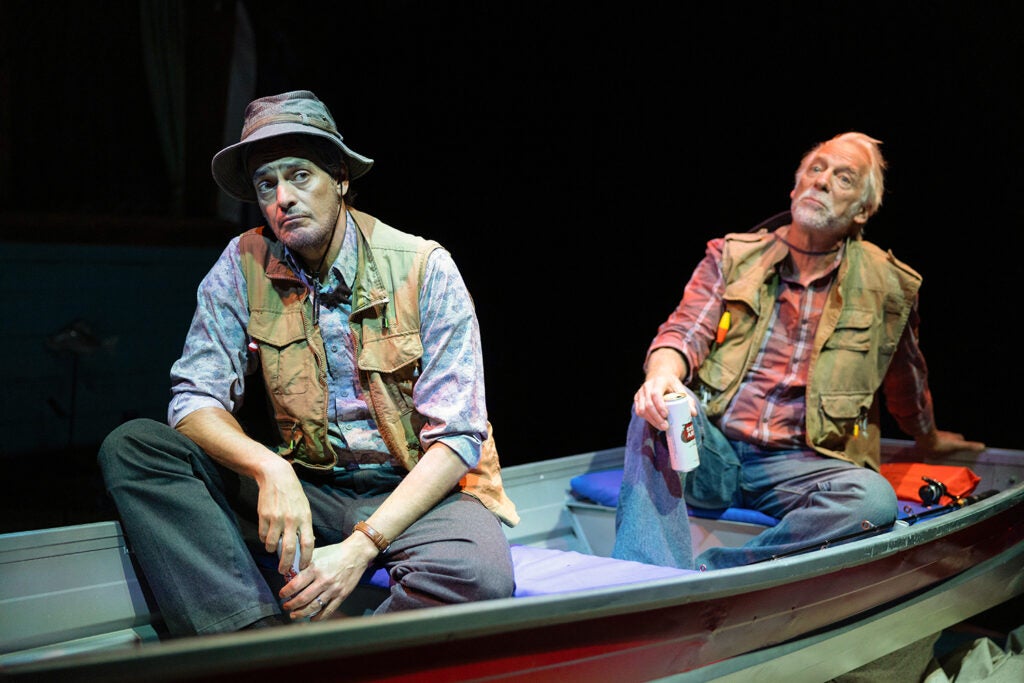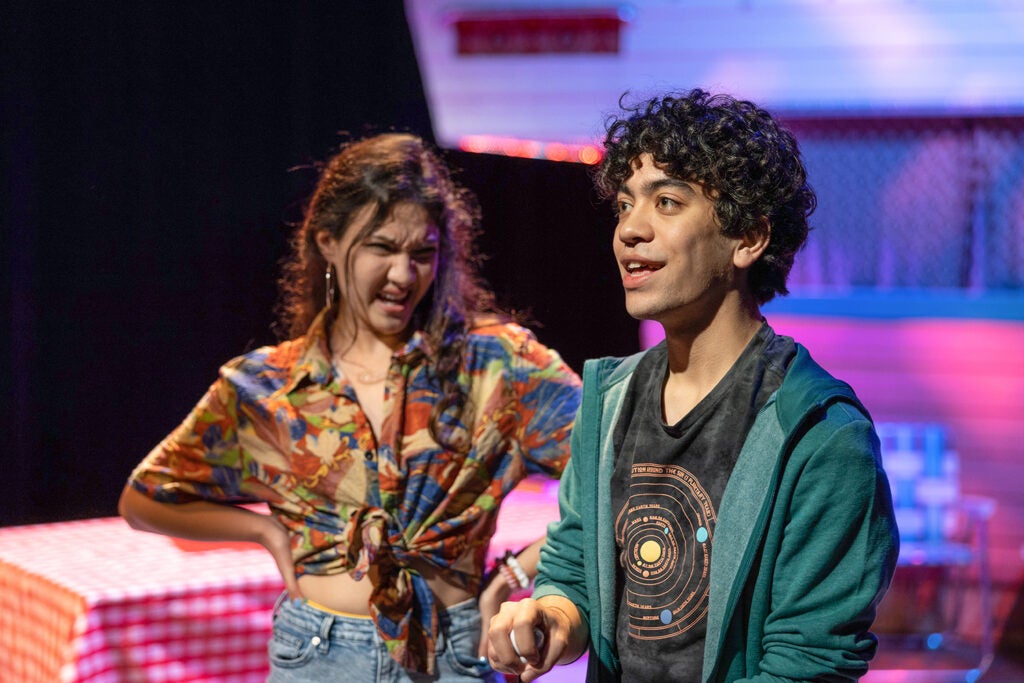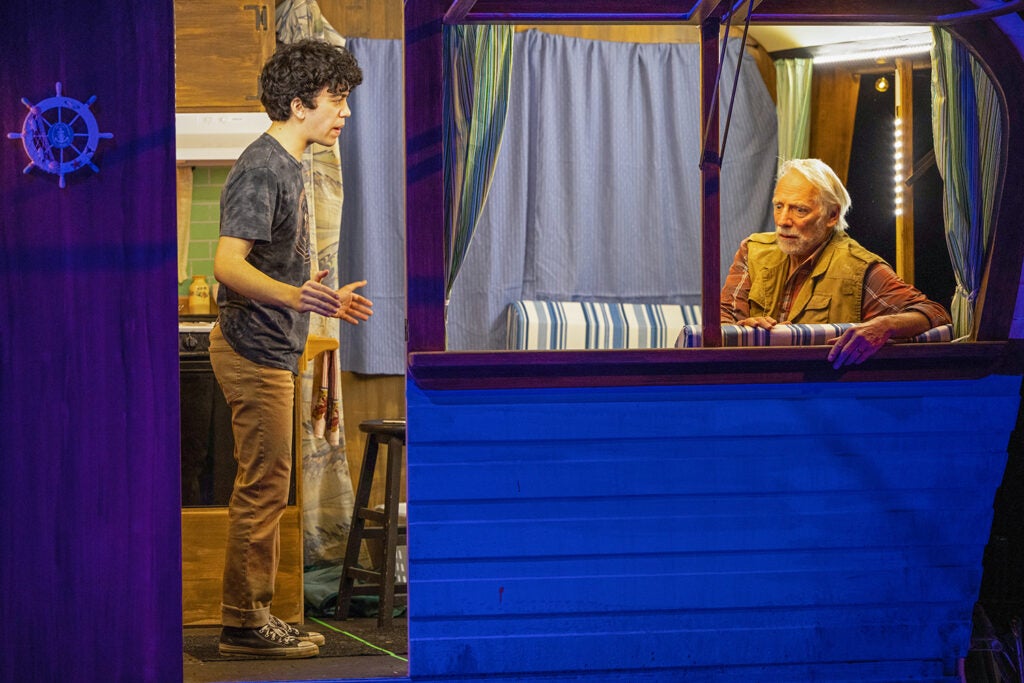Arab American playwright Betty Shamieh’s new play, As Soon As Impossible, features Stanford students and faculty as cast and crew
Shamieh developed the play, which explores race and gender dynamics with a light touch, while a virtual Stanford Denning Visiting Artist earlier this year. The play opens to a live audience at the Harry J. Elam, Jr. Theater this month.
Two years ago, Assistant Professor Samer Al-Saber and Arab American playwright Betty Shamieh sat down to figure out how they could work together in the classroom, on the page and on the stage. That meeting led to in-class collaborations at Stanford, the development of a new play during Shamieh’s Denning Visiting Artist residency in 2021, an online reading of the play with TheatreWorks of Silicon Valley, an edited anthology of Shamieh’s plays, and finally, to the in-person premiere of the play, As Soon As Impossible, with a student and faculty cast and crew this month at the Harry J. Elam, Jr. Theater.

Egyptian film actor Kal Naga (aka Khaled Abol Naga) playing Iraqi American “Ramsey” and Professor Rush Rehm playing Anglo-Saxon Protestant “Arthur.” (Image credit: Frank Chen)
Al-Saber, who teaches in the Department of Theater and Performance Studies (TAPS) in the School of Humanities and Sciences and is directing As Soon As Impossible, said of the initial meeting and subsequent collaborations, “It is unusual for encounters between artists to be this rich and productive. Upon reflection, I know that our shared condition of being Arab has formed the foundation of this creative connection.” In addition to teaching and directing with TAPS, Samer is a member of the faculty at the Center for the Comparative Study of Race and Ethnicity (CCSRE) and the Abbasi Program in Islamic Studies where he teaches courses concerned with identity, race and ethnicity at the intersection of Islam and the arts. He joined Stanford as part of the Faculty Development Initiative in 2018.
As Soon As Impossible is a comedy that explores the relationship between two older men, an Iraqi American and a white Anglo-Saxon Protestant, whose annual summer fishing trip is interrupted by the unexpected appearance of Ramsey’s granddaughter, Layla. The play is ultimately about friendship in a time of war.

Student actors Margarita Belle Jamero, ’24, and Morgan Gwilm Tso, ’22, rehearsing As Soon As Impossible. (Image credit: Frank Chen)
“I am known for writing hard-hitting dramas about the Palestinian and Arab American female experience,” said Shamieh. “I believe As Soon As Impossible is possibly my most potent play because it deals with the issues of race and gender dynamics that are my obsessions, with a light touch.”
Students, faculty and professional theater artists collaborated to bring Shamieh’s play to the stage. The cast includes two undergraduate TAPS majors, Margarita Belle Jamero, ’24, and Morgan Gwilm Tso, ’22, performing alongside TAPS and classics Professor Rush Rehm as “Arthur,” and Egyptian film actor Kal Naga (aka Khaled Abol Naga) as “Ramsey” and “Abdullah.”
Tso says of his experience, “I cannot express enough appreciation to playwright Betty Shamieh for bringing this piece to us; to work alongside the playwright herself, hearing her insights and inspirations, was both intimidating and fascinating.”
Including assistant directors and designers, stage management, crew, and set carpenters and costume stitchers, 27 graduate and undergraduate students engaged in this unique experience of mounting the playwright’s new work.
Virtual beginnings
During the fall quarter of 2020, with extended restrictions of on-campus activities due to the pandemic, Stanford’s Office of the Vice President for the Arts announced an expedited round of grants available to Stanford staff and faculty in any academic department or program to support virtual visiting artists for the winter and spring quarters of 2021. TAPS, in cooperation with the Center for Comparative Studies in Race and Ethnicity and the Abbasi Program in Islamic Studies, was awarded a grant to host Shamieh virtually during the spring quarter of 2021.
The outline of the playwright’s engagement included a long-duration developmental workshop of a new play where students, faculty and staff would create a virtual lab environment for testing various scenes and the overall structure of the play and providing real-time feedback. Rather than presenting the play virtually at the end of the spring quarter, Shamieh was invited to extend her visiting artist engagement and present a live version of the play this fall quarter.
“I am grateful to have been able to develop this play as a Denning Visiting Artist with the amazing director, Samer Al-Saber, whose incisive insights into the text have strengthened it immeasurably,” said Shamieh. “Much thanks to the team at TheatreWorks Silicon Valley for presenting a reading of this project in their New Works Festival Online, which allowed us to continue our work together and connect with audiences despite the pandemic. I am very happy to have crossed paths with the talented Stanford students, design team, cast and crew who so joyously have collaborated to bring this story to life.”
In his director’s note for the play, Al-Saber gives instructions to the audience on how they can bring the story to life for themselves. He writes, “Take a look at the stage: two trailers. Look at the cast/character list: four characters. A story is about to unfold here at the Harry J. Elam, Jr. Theater’s Lake Berryessa. When the lights go down, you will hear one grandpa tell his grandson to ask permission before hanging some lights, and then another grandpa will ask his granddaughter why she’s there. They’ll cook fish and eat beans, and then other things will happen. Throughout, your generous spirit will lead you beyond any discomfort or formulaic response. Instead, you’ll find that misunderstandings can make us better, laughter teaches us about ourselves and others, and generation upon generation, a birthday is a birthday.”
Opening night is sold out, but tickets are available here for the remaining five performances on Nov. 12-13 and 18-20.
This play was originally commissioned by Second Stage with support from the Time Warner Commissioning Program. This production was made possible in part by the Stanford Visiting Artist Fund in Honor of Roberta Bowman Denning (Office of the Vice President for the Arts), the Sohaib and Sara Abbasi Program in Islamic Studies, the Pigott Fund for Drama, the May Ellen Ritter Production Fund, and the Drs. Ben and A. Jess Shenson Fund.
